Yolande Knell
Middle East correspondent
Reporting fromJerusalem
Callum Tulley
BBC News
Reporting fromJerusalem

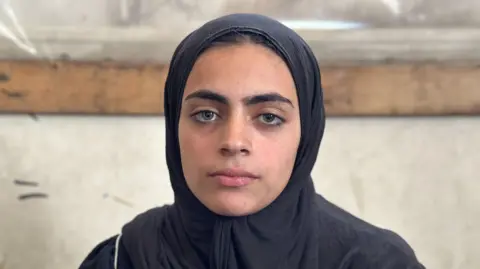 BBC
BBC
Aya al-Skafi's daughter, Jenan, died aged four months after doctors could not find her the special formula she needed
Amid a deadly war in Gaza, new lives begin. But newborn babies and those still in the womb are among the worst hit by the harsh conditions.
With acute shortages of food, the UN says that one in 10 new babies is underweight or premature. There has also been an increase in miscarriages, stillbirths and congenital abnormalities.
At Nasser hospital in the southern city of Khan Younis, Malak Brees, now seven months pregnant, fears the Israeli bombings and evacuation orders, and losing her baby.
"I'm frightened that I could have a premature birth at any time and that my amniotic fluid isn't enough for the baby to grow in," she tells the BBC.
Malak did not expect to conceive her second child. Six weeks ago, she lost a lot of amniotic fluid, putting her baby in danger.
"The doctors told me it was due to malnutrition and exhaustion... They told me it was in the hands of God - the foetus could survive or die."
While poor nutrition is causing new hazards in pregnancy, childbirth too has become far riskier.
Israel's total blockade on Gaza imposed on 2 March - which it said was to pressure Hamas - was only partly eased two weeks ago. There is a lack of basic medical supplies, including painkillers, and basic hygiene products.
Sometimes Israeli military action and displacement mean that women are giving birth in their tents or shelters with no medical help.
"If mothers are lucky enough to come to the hospitals to deliver their babies, women who give birth vaginally are typically being sent home three to four hours afterwards," says Sandra Killen, an American registered emergency and paediatric nurse, who recently worked at the hospital in Gaza.
"Women who have had surgical C-sections [Caesareans] are discharged after 24 hours," she said.
"They're discharged to their homes quite often with babies who have conditions and various issues that in normal circumstances we would have stay at the hospital to get more support.
"Most babies, outside of Gaza, born under 32 weeks, under 1,400g (3.1lb), they would be in the NICU [neo-natal intensive care unit]. These babies are sent home. There's just no space for them."

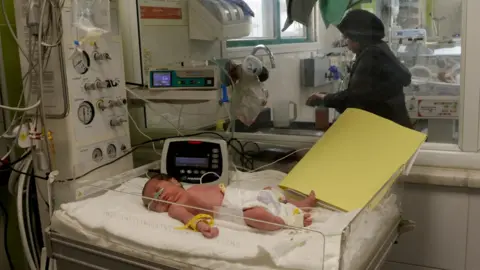 Reuters
Reuters
Nasser hospital has been overwhelmed since an Israeli strike put the nearby European hospital was out of service
Nasser hospital still has a working neo-natal intensive care unit, and it is full. Doctors say they have been overwhelmed by patients since the nearby European hospital was targeted in a deadly Israeli bombing on 13 May and put out of use.
Israel's military has repeatedly attacked hospitals during nearly 20 months of war and says it targeted the local Hamas leader, Mohammed Sinwar, in an underground base beneath the European hospital's compound.
It accuses Hamas of routinely hiding its fighters and infrastructure behind the sick and wounded, something the armed group denies.
With access to basic healthcare now very difficult, most of what the UN estimates are 55,000 pregnant women in Gaza are not able to get regular pre-natal checks.
"The psychological state of the women at the point of childbirth is heartbreaking, may God help them," says Dr Ahmad al-Farra, a head of paediatric and maternity care at Nasser hospital.
"They are fully aware that their unborn babies are not being properly monitored and they themselves did not receive adequate nutrition, so they expect their babies to suffer from low birth weight or other complications. That's the first concern."
"The second is that after giving birth, they are deeply worried about how they will manage to breastfeed or even secure formula, especially with the ongoing lack of food. Both options are equally difficult."

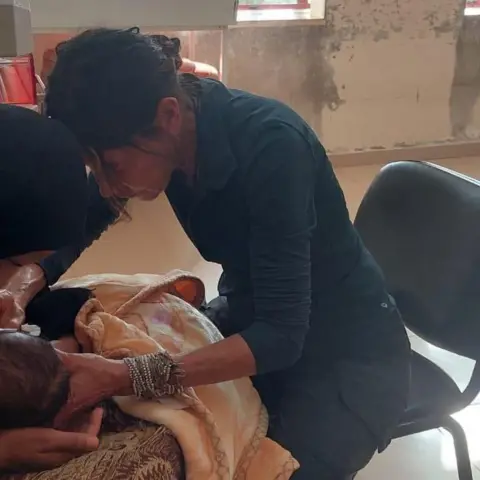 Sandra Killen
Sandra Killen
Nurse Sandra Killen is a lactation specialist who helps breastfeeding mothers
Wiping away tears, Aya al-Skafi is looking at photos of her daughter, Jenan, in a shelter in Gaza City.
The baby was born during the ceasefire earlier this year and initially she was in good health. But as food became scarce, her mother struggled to breastfeed.
"After the crossings were closed, everything was closed on us," Aya says. "There was no flour, no clean water, no food like fruits and greens that you need to be healthy. When my condition worsened, Jenan's condition worsened even more."
Jenan was diagnosed with malnutrition and dehydration and had problems with digestion. Doctors could not find her the special formula that she needed.
"I was torn into a thousand pieces to the extent that I wanted to scream to the whole world, saying: 'Save my daughter from death, save her!'" Aya recalls.
"I begged for help but only God, Lord of the World answered. Only God saved her from the cruelty of this world."
Jenan died last month - she was four months old.

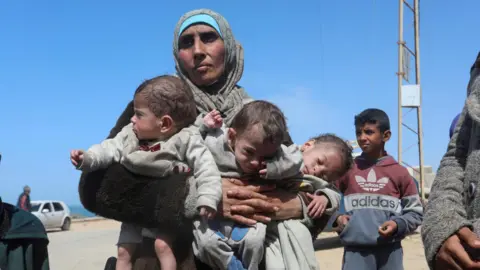 Reuters
Reuters
Children under the age of 18 make up half of Gaza's population of 2.1 million
Many mothers are struggling to breastfeed because of their own poor health but a Scotland-based organisation, the Gaza Infant Nutrition Alliance, has been training local medics to give more support.
Nurse Sandra Killen, who is also a lactation specialist, works with them.
"We absolutely recommend breastfeeding, even when mothers are malnourished unless they are acutely malnourished," she says.
"Quite often mothers who have been given formula, they become dependent on it, their milk supply decreases then they don't have access to formula, or they don't have clean water."
Now back home in the US, Sandra recounts some distressing cases that she encountered in Khan Younis and at the al-Aqsa Martyrs' Hospital in the central town of Deir al-Balah.
A first-time mother had visited the hospital ahead of giving birth, but Israeli air strikes meant she ended up delivering her baby alone with her husband in their tent camp.
For five days, she had difficulties getting her newborn to breastfeed. When it was finally safe to travel to the hospital, it was too late to save her baby.
Another woman and her infant survived a tank shelling near her home, but she had shrapnel in her chest, part of which severed her milk duct. She needed expert advice on how to continue feeding.
A mother of four was responding well to help feeding her premature newborn but then her tent was bombed. Her husband was killed and, a few hours later, they received an Israeli military evacuation order.
The woman fainted as she fled with her children and was unable to breastfeed for three days. In her case, fortunately, they managed to find baby formula.
"There is story, upon story, upon story," says Sandra. "Overall, we're experiencing a huge, huge increase in desperation, in hopelessness and suicidal ideation."

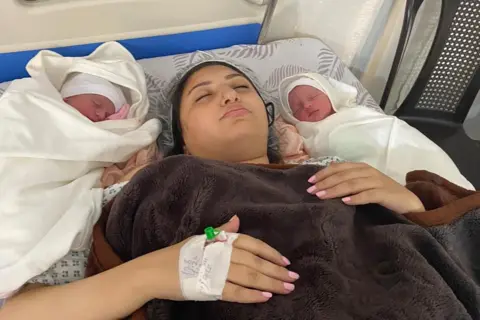 Family handout
Family handout
Jomana Arafa was photographed with her newborn twins, Aysal and Asser, three days before they were killed in an Israeli strike
Big families are the norm in Gaza, but in displaced people's camps, many women do not have the usual support from relatives and friends as they go through their pregnancy and then their struggle with newborns.
As well as working in Gaza twice in the past year, Sandra has been giving advice to women remotely. She became close to a pharmacist, Jomana Arafa, during her high-risk pregnancy with twins.
"I gave birth yesterday, Sandra, with a C-section and, thank God, my babies and I are in a good condition and health," Jomana says in a voice-message in English which she sent with photographs last August. She had named her baby boy Asser and the girl Aysal.
But the joy for Jomana and her family was to be horribly short-lived.
Three days later, her husband, Mohamed Abul-Qomasan, was getting the babies' birth certificates when he got news that his wife, their newborns and his mother-in-law had been killed in an Israeli missile strike at their shelter in Deir al-Balah.
Journalists at the al-Aqsa Martyrs' Hospital filmed Mohamed as he collapsed in the courtyard.
At the time the Israeli military said it did not have knowledge of the incident, adding that it targeted "only military objectives", taking steps to minimise harm to civilians.
For Sandra, the death of Jomana, her mother and new babies was "devastating beyond devastating, heartbreaking beyond heartbreaking". "I still think about it, and I sob," she says.
In Gaza, for most women, pregnancy and childbirth were once a time of eager anticipation and excitement but now they are times of heightened stress and fear.
Rather than representing the hope of new life, babies have come to epitomise the struggle to survive.

 1 day ago
2
1 day ago
2

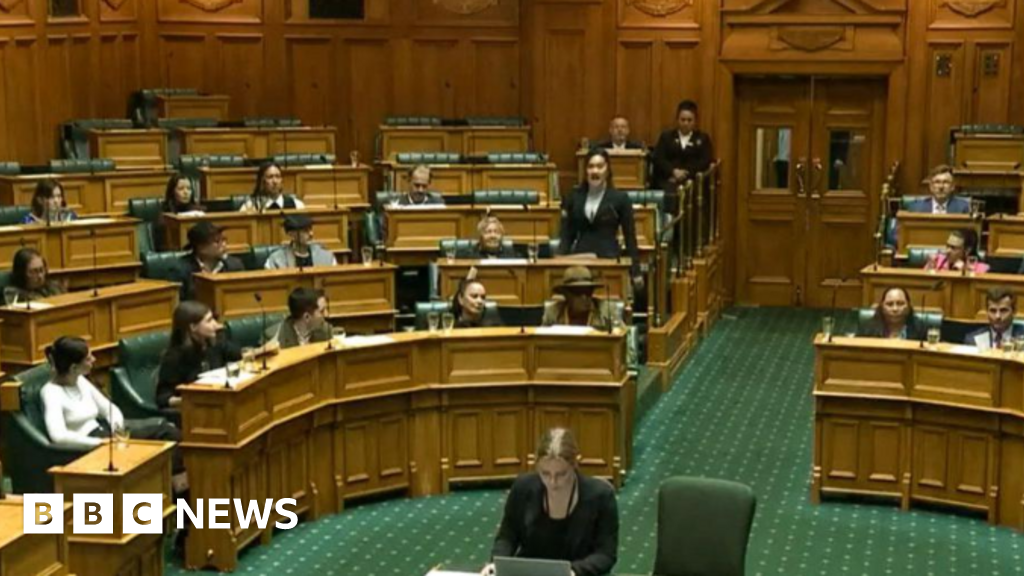
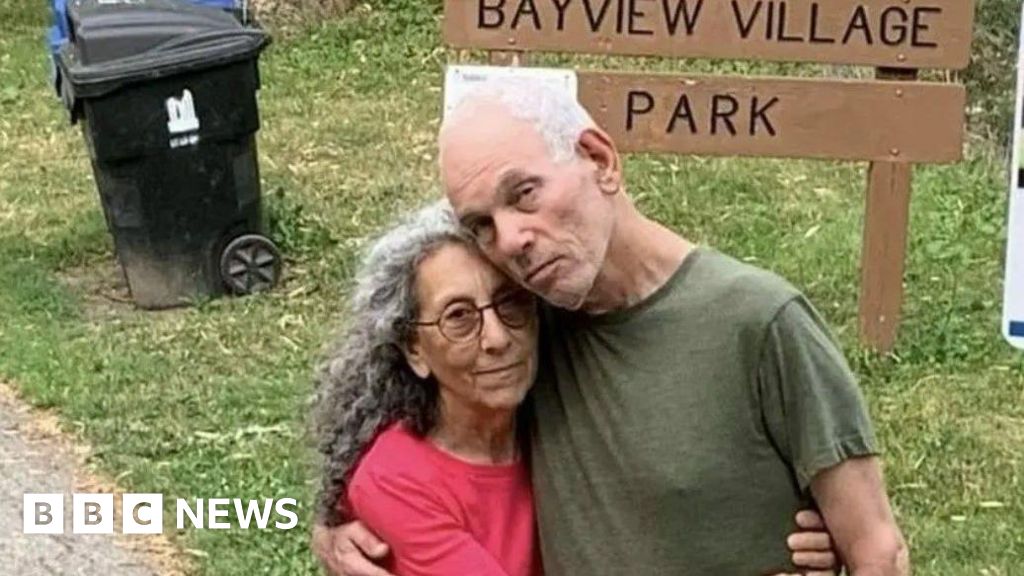



 English (US) ·
English (US) ·